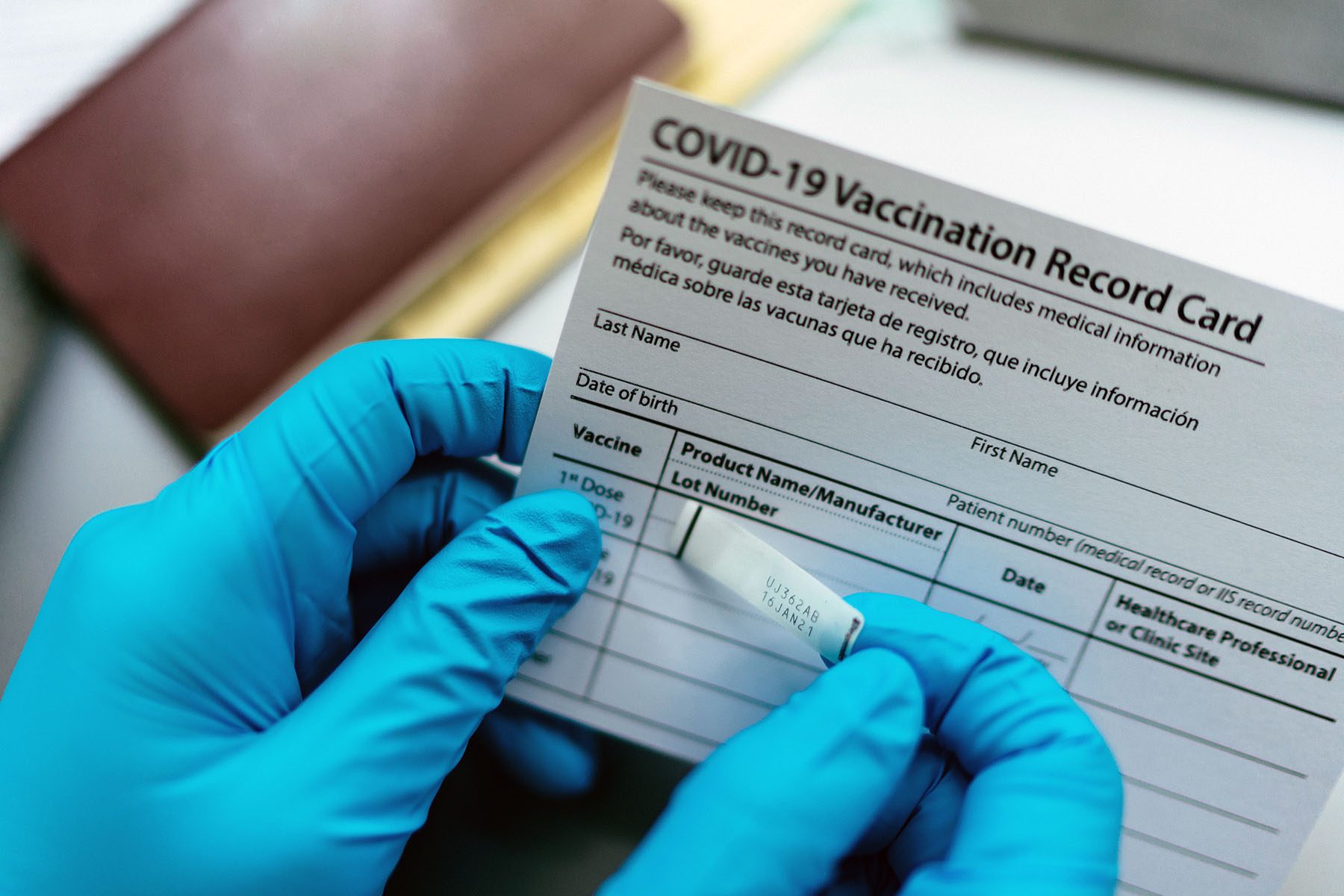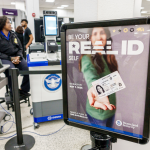*Correction appended. Editor’s note: This article has been updated with additional comment from the CDC.
Orly Mahoney changed their name in January 2021. In the weeks and months after, they took stock of the documents they would need to update, a “domino effect” of paperwork: Social Security, driver’s license, insurance card, passport. Also on that list? Their COVID-19 vaccination card.
Mahoney, a 26-year-old nonbinary medicine student, had received their first COVID-19 shot just one week before their legal name change went into effect. When they received their second dose a month later, they used the same card, but soon decided they wanted to change their name on it. With new documents in hand, they called the clinic where they were vaccinated looking for answers. How could Mahoney get their name on the card? Could they get a new one?
Nobody at the clinic or their primary care office was able to help.
“It was really a Herculean amount of work to change my name in all the ways that I needed to change my name. And this is one of only a couple things that remains a sticking point,” Mahoney said. “There’s just this perpetual feeling of unfinishedness … it shouldn’t be this hard.”
Since it didn’t seem like they could get a new card, Mahoney requested a name change within the patient portal at Massachusetts General Hospital, where they worked at the time, and printed their full vaccination record. They now carry that printout with them whenever they travel, plus their original name change document and Centers for Disease Control and Prevention vaccination card. The hospital did not respond to a request for comment.
Not having their vaccination card reflect their name change has impacted Mahoney. “It is constantly there, the idea of being outed,” they said.
They don’t always mind being read as a woman, but they don’t want to be outed as transgender at any random moment inside an airport — or have to explain their gender to a customs official. This matters especially because they left Boston in late August to attend Trinity College in Dublin, where they’re studying medicine — one step closer to their goal of becoming a doctor and going into trans health care.
“I just love the idea of maybe even overhauling a medical records system, or even just intake forms for people,” they said. Although legal names are necessary for insurance purposes, as a doctor, Mahoney would not want to know the deadnames — the names used pre-transition — of any of their potential future patients.
Mahoney is one of several trans and nonbinary people who told The 19th they feel like they are being put in stressful situations where they are required to out themselves, or use their deadname. Some also feel like they are being left out of data collection on COVID-19 vaccination entirely — that transgender people are an afterthought.
In a population that already deals with costly documentation changes and insurance headaches for gender-affirming care, COVID–19 vaccination records and the varying pharmacy rules to get the shot present another potential paperwork hurdle.
In April last year, CVS Health Corp. told Reuters that it would only require that patients disclose their gender to receive a COVID-19 shot, instead of sex assigned at birth. The company has since returned to requiring sex assigned at birth in its online vaccination intake form. A pop-up note on CVS’ website notes that the CDC requires CVS to collect sex assigned at birth for COVID-19 vaccines.
“Our pharmacy team uses this to provide information about your medications and vaccines such as potential side effects that relate specifically to your sex assigned at birth,” CVS says on its site, after noting the CDC requirement. CVS did not respond to a request for comment.
The CDC uses sex assigned at birth, a required part of data collection for the COVID-19 vaccine, to monitor trends in disease and vaccination, as well as side effects, CDC spokesperson Jasmine Reed said.
“We do not provide guidance for how providers should seek information about sex or gender for the COVID response,” she said in an emailed statement. People wishing to change their name on immunization records, including CDC vaccination cards, need to work with state, tribal, or local authorities, she said. Those with further questions should contact their state health department, which is responsible for distributing the cards to vaccination providers, Reed added.
It’s a piece of paper. Let’s get a new piece of paper.
Sam Miller, who wrote the pharmacy resource for trans inclusivity co-published by the American Pharmacists Association and Human Rights Campaign
Kellan Baker, executive director and chief learning officer of Whitman Walker, a D.C.-based health care provider focused on serving LGBTQ+ people, said that the CDC should issue guidance to pharmacies on how to collect data simultaneously for sex assigned at birth and gender identity. The agency should also acknowledge the problem arising for some trans and nonbinary people with vaccine record cards, he said, and publicly support accurate documentation.
“It is not a matter of personal preference, it’s a matter of critical services access and that transgender people need to have documentation that is aligned with who they are,” Baker said.
The CDC says on its website that, in general, collecting patients’ sexual orientation and gender identity is crucial to understand and meet the specific health care needs of LGBTQ+ people. The agency also acknowledges that trans people, especially trans women of color, may delay medical care due to negative health care treatment.
The issues that some trans and nonbinary people have faced while getting their COVID-19 shots are just one example of other unique documentation hurdles faced by the community at pharmacies, said Jay Holloway, a staff pharmacist at Heart City Drug in Valentine, Nebraska.
The difficulty that pharmacies face when running prescriptions through insurance — without putting the patient’s deadname on the label — is one example of a policy that creates a hostile environment for transgender patients, he said in an email. Having more trans and gender-diverse voices when designing patient intake is essential, Holloway, who uses both they/them and he/him pronouns, added.
“If we ever want to accurately know about how trans identity affects health, we have to have data that includes trans people,” he said.
And some of that data is going uncollected.
A 37-year-old living in Washington state, who recently left a job as a fisheries observer for the National Marine Fisheries Service, also known as NOAA Fisheries, and asked to not use their name to protect their privacy, said it felt like it didn’t make any sense when they were asked for their sex assigned at birth to get vaccinated.
The whole interaction was uncomfortable, they said — and more stressful than the other countless situations they’ve faced as a nonbinary genderqueer person trying to fill out paperwork for jobs or for medical care.
Ultimately, they chose to decline to state their sex at birth on the form by leaving it blank at their first COVID-19 shot appointment at a local independent pharmacy. They still got the shot — the most important thing at the time — but the employees seemed disgruntled, they said.
A computer technician in Olmsted County, Minnesota, who asked to withhold her name and further identifying details due to not being out as a trans woman at work — where she has overheard openly transphobic jokes more than once — said she was asked specifically for her sex assigned at birth when filling out intake forms for her COVID-19 vaccinations. There was no additional space to add her gender identity on the form. She shared a flu shot consent form from the same clinic with The 19th as an example.
“It needlessly puts us at risk of being outed,” she said. “I just know that people would, even if they weren’t transphobic, they’d treat me differently.”
The technician marked ‘female’ on the form, since she has been on hormone replacement therapy for seven years and figured those physical changes to her body were most relevant to the question — as well as her safety.
Sam Miller, a Chicago pharmacist licensed in July 2020 who wrote the pharmacy resource for trans inclusivity co-published by the American Pharmacists Association and Human Rights Campaign, said that pharmacies should ask for gender identity and pronouns whenever requiring patients to divulge sex assigned at birth.
“When we’re looking at vaccine hesitancy too, we don’t want to have things on forms that are making patients uncomfortable,” he said.
As far as updating vaccination record cards, Miller said he couldn’t imagine why changing that if the patient has legally changed their name would be a problem. While pharmacies often have software systems that don’t accept storing preferred names as well as legal names, Miller noted that he has personally shredded old vaccine cards and written new ones for patients after accidentally miswriting the date.
“It’s a piece of paper. Let’s get a new piece of paper,” he said.
Holloway wrote over email that pharmacies asking for gender identity and sex assigned at birth would include trans and nonbinary people, as well as intersex people.
“If your data collection doesn’t include gender identity, you’re missing out on an entire marginalized patient population,” they said.
A 22-year-old student at Reed College in Portland studying linguistics, who is trans and nonbinary and asked not to use their name to protect their privacy on campus, said that their school’s health center asked if patients were male or female, as well as their immunocompromised status and other questions.
When they asked for more clarity before getting their booster shot, the person administering the shot advised them to mark their sex assigned at birth, they said. When they asked why, the staffer didn’t really have an answer.
The student marked their sex assigned at birth, partially because they expected some kind of argument or consequence if they pressed the issue.
Reed College asks for students’ birth sex to monitor rare potential vaccine side effects, not for demographic reasons, spokesperson Mandy Heaton said over email, by following the CDC’s COVID-19 screening form. The college isn’t required by the CDC to report any information from that form to state or federal agencies, she said.
“Ultimately, students can have any name written on their COVID-19 vaccine card that they choose,” she added.
The student also needed a replacement vaccine card, since they’d lost their original one. Without asking, the staffer wrote down the student’s legal name. After the student asked to use their preferred name, the staffer wrote the student’s preferred name above their first and last name.
“It just kind of seemed arbitrary,” they said. “Why does this person get to decide the way that my name is reflected on here?”
Correction: An earlier version of this article misspelled Olmsted County, Minnesota.







